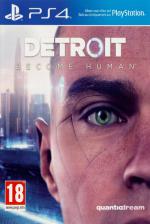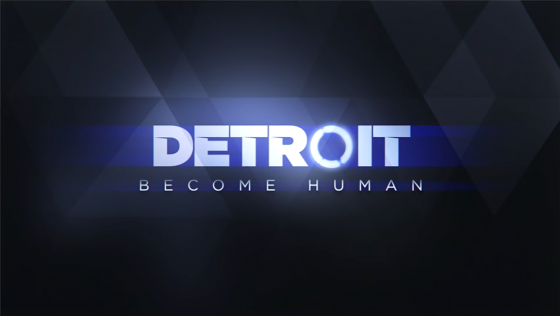
US Gamer
 24th May 2018
24th May 2018
Author: Mike Williams
Publisher: Quantic Dream
Machine: PlayStation 4 (EU Version)
Press X to have a dream.
Detroit: Become Human
It's interesting how far Quantic Dream has come with what are essentially big-budget visual novels. The developer's earlier works, Omikron: The Nomad Soul and Fahrenheit, leaned on the adventure side in terms of genre. Since the release of Heavy Rain in 2010, the studio has given itself over to these visually-stunning story engines.
Let's get that part out of the way quickly: Detroit: Become Human is a beautiful game. The environments are lovingly-rendered, placing characters in the gleaming metal lines of futuristic Detroit, or the ramshackle decay of its less than wonderful neighborhoods. Puddles of water reflect neon light, snow falls, light shines through stained glass. Quantic Dream's art team deserves every bit of their paychecks.
The focus here is on the story though. It's the year 2038 and androids have become a commonplace appliance for the average person. These lifelike robots have taken over several facets of society, handling menial tasks like office work, construction, and housework. They have all the abilities of real people, without any of the free will. That is until some androids begin to turn, becoming "Deviants". Deviants have free will and something approximating emotions, which makes them people, right?
After trying out a single protagonist for Beyond: Two Souls, Quantic Dream and writer/director David Cage are returning to a branching tale with multiple characters. You begin the game as Connor, a state of the art android trying to find out why deviants are manifesting at much higher rates. Then you jump to Kara, an android housemaid trying to protect a little girl from her abusive home. Finally, there's Markus, a caretaker to a millionaire artist, who finds his life quickly torn apart.Early on, the sense of familiarity is strong. Connor is paired up with detective Lt. Hank Anderson in his story track; one is an emotionless android on a mission, the other is an alcoholic detective fallen from grace. (Together, they fight crime.) Markus is living the good life with his kindly artist owner, until he's framed for a crime he didn't commit, with shades of a slave living in the Antebellum South. Kara breaks her conditioning to save abused child Alice from her father. You've seen these stories many times before and you can probably guess the general direction of those plotlines early on.
It also doesn't help that Cage himself hasn't learned much in the way of subtlety. Detroit: Become Human never veers wildly off-course like Beyond: Two Souls' odd Navajo chapter, but the general references to real-life social issues are delivered with the grace of a freight train. Androids ride in the back of the bus. At one point, an android spray paints "We Have a Dream" as the rallying cry of their civil right movement. (To be fair, that's a choice.)
Detroit: Become Human sometimes feels like it's running down a checklist of those issues, appending "but with androids!" at the end. The civil rights movement and racism, but with androids! Domestic abuse, but with androids! The perils of sex work, but with androids! Police brutality, but with androids! The Underground Railroad, but with androids! Internment camps, but with androids! The more direct the analog, the more than Detroit falters. It feels like there were different, more interesting ways some of these story choices could've played out. A number of folks will likely check out when some of these direct references pop up and I wouldn't blame them.Detroit: Become Human tends to work well when it plays up the inherent inhumanity of its characters. One character finds themselves in a horrific graveyard of dismantled androids; broken, beaten creatures that look human, but are somehow surviving worse fates. Another character tries to comfort a friend when they meet their unactivated showfloor model. There's the eerie stillness of a forgotten theme park full of androids standing still with frozen smiles, waiting for just one family to visit. When Detroit moves a beyond the idea of "these are mostly people, but people abuse them because they're not," it gets better.
The antagonists of the entire thing are remarkably threadbare, if only because they disappear for most of the game. Amanda, Connor's immediate superior, is probably the one who gets the most screentime, but she's as one note as the others. I assume the idea Cage was going for is "the real antagonist is humanity as a whole," but some of the actual antagonists could stand to get some more meat.
Beyond the predictable and straightforward nature of the main characters, Detroit: Become Human still had me believing in their relationships. Connor and Hank getting to know each other, with Connor slowly becoming more human. Kara and Alice's growing sense of family. Markus is probably the weakest link in terms of growth, but that's because his transition from caretaker to android civil rights leader is remarkably quick. The character gets by on the strength of actor Jesse Williams, who can make any speech sound rousing.What helps is that the performance capture is damn good across the board with a few exceptions: Lance Henriksen is a great actor, but his character in the game looked oddly inhuman for some reason. In contrast, Clancy Brown is a winner as Connor's partner. Kara, Markus, and Connor are all well-portrayed by Valorie Curry, Williams, and Bryan Dechart; a shout-out to the latter, who spends the first half in a robotic speaking cadence and has the greatest personality transition over the course of the game.
Well, over the course of my game. Quantic Dream is big on highlighting the diverse story paths available to players over the course of the game. Whenever you finish a chapter, the game gives you an entire flowchart of the choices you made and actions you took. This allows you to see if you missed something in a section-you know you missed something, you just don't know what-or what the major outcomes of a chapter are.
It's honestly the best decision Quantic Dream has made. One, it allows players to see exactly how many different ways a single chapter can go. Two, if you feel you made a mistake, you can quit out to the main menu and pick up the chapter again at one of the earlier checkpoints. You're not stuck on a single train ride until the end. A few times, I got a chapter ending, decided, "That's not how this is going," and played through the section again. It's a much better option than locking players onto a one path because they didn't understand a choice or missed a quick time event.As I rounded the corner of Detroit: Become Human, I found myself enjoying it more than Heavy Rain or Beyond: Two Souls. Heavy Rain was unrelentingly bleak and many of the relationships in Beyond: Two Souls weren't built up in a satisfying way. Here, I like the main characters and their immediate supporting casts. The writing still isn't as strong as it could be for a narrative-focused titles, with games like Nier: Automata tackling some of the same concepts in a more unique manner, but it didn't turn me off of the game completely.
Detroit: Become Human is still marred by some of the issues that plague previous Quantic Dream games. Rough, ham-fisted writing and story pacing that's thrown off at times by the playable sections. I'm also pretty sure that most folks are going to get one of the more unsatisfying endings their first time around. But I like the characters, which is more than I could say for the last two games. And when I finished the game, I wanted to jump back in and try out some other choices. Quantic Dream is getting better, even if Detroit: Become Human not on par with some of the better visual novels out there.
Verdict
Detroit: Become Human improves upon its predecessors by having a cast that you enjoy and want to spend more time around. Quantic Dream's visual craft and presentation is top-notch, but the writing hasn't quite caught up yet. It isn't subtle and some of the references to social ills are amazingly on-the-nose instead of being more unique. It's better than Beyond: Two Souls, but there's still room to grow.
Other PlayStation 4 Game Reviews By Mike Williams
Scores
PlayStation 4 Version| Overall | 70% |















